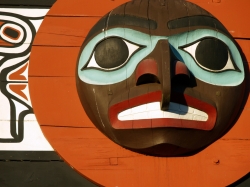Search for Resources
Description
Students are introduced to the Indigenous idea of two-eyed seeing, learning to see from one eye with the strengths of Indigenous knowledge and ways of knowing and from the other eye with the strengths of Western knowledge and learning to use both these eyes together, for the benefit of all. (Elder Albert Marshall)
In this activity, students identify the differences and similarities between Indigenous Peoples’ ways of knowing and Western ways of knowing and the relationship between both ways of thinking. They decide how using both knowledge systems can help us live well with water. Students suggest how two-eyed seeing might help us live in a good way with water.
These materials were created with guidance from Indigenous educators, subject matter experts and thought leaders to help draw upon essential teachings, learnings, and Indigenous perspectives.
General Assessment
Strengths
Throughout the activity, teacher could consider how well students:
- Identify different perspectives about water.
- Make accurate observations from text and other sources.
- Use evidence to make decisions.
- Contribute to group discussions.
- Demonstrate flexibility in thinking.
Recommendation of how and where to use it
This activity provides an opportunity to open the discussion regarding Indigenous Peoples’ ways of knowing and viewing their perspectives and knowledge as sources of valuable information. Our water use must be carefully considered with a view towards not just the immediate need and impact but the needs and perspectives of future generations. The resource suggests activities to modify or extend the learning by providing students with other critical environmental issues and describing how two-eyed seeing might help address the issue (e.g., climate change, conserving water, logging of old-growth forests)
Relevant Curriculum Units
The following tool will allow you to explore the relevant curriculum matches for this resource. To start, select a province listed below.
- Step 1Select a province
- Alberta
- Step 2Select a grade level
- Grade 4
- Step 3Select a subject
- Science
- Step 4Relevant matches
- Earth Systems: Understandings of the living world, Earth, and space are deepened through investigating natural systems and their interactions.
- Social Studies
- Step 4Relevant matches
- Analyzing diverse worldviews and experiences fosters our ability and willingness to live well together
- Exploring connections strengthens our understandings of relationships to help us make meaning of the world
- Grade 6
- Step 3Select a subject
- Science
- Step 4Relevant matches
- Students investigate climate and describe the interactions between the Sun, water, air, and land.
- British Columbia
- Manitoba
- Step 2Select a grade level
- Grade 4
- Step 3Select a subject
- Indigenous Languages and Cultures
- Step 4Relevant matches
- Cultural and Linguistic Diversity: Cultural Diversity
- Grade 5
- Step 3Select a subject
- Indigenous Languages and Cultures
- Step 4Relevant matches
- Cultural and Linguistic Diversity: Other Cultures: Connections and Influences
- Grade 6
- Step 3Select a subject
- Indigenous Languages and Cultures
- Step 4Relevant matches
- Cultural and Linguistic Diversity: Cultural Diversity
- Cultural and Linguistic Diversity: Other Cultures: Connections and Influences
- New Brunswick
- Northwest Territories
- Step 2Select a grade level
- Grade 4
- Step 3Select a subject
- Indigenous Languages and Cultures
- Step 4Relevant matches
- Dene Kede: The Land
- Social Studies
- Step 4Relevant matches
- The NWT: Our Places, Stories and Traditions:Living in the NWT
- Grade 5
- Step 3Select a subject
- Indigenous Languages and Cultures
- Step 4Relevant matches
- Dene Kede: The Land
- Science
- Step 4Relevant matches
- Science 5: Earth materials change as they move through the rock cycle and can be used as natural resources.
- Grade 6
- Step 3Select a subject
- Indigenous Languages and Cultures
- Step 4Relevant matches
- Dene Kede: The Land
- Nova Scotia
- Step 2Select a grade level
- Grade 4
- Step 3Select a subject
- Social Studies
- Step 4Relevant matches
- Social Studies 4: Physical Environment
- Nunavut
- Step 2Select a grade level
- Grade 4
- Step 3Select a subject
- Social Studies
- Step 4Relevant matches
- Provinces and Territories: Our Places, Stories, and Traditions: The Land: Place & People
- Ontario
- Step 2Select a grade level
- Grade 5
- Step 3Select a subject
- Social Studies
- Step 4Relevant matches
- People and Environments: The Role of Government and Responsble Citizenship
- Saskatchewan
- Step 2Select a grade level
- Grade 4
- Step 3Select a subject
- Social Studies
- Step 4Relevant matches
- Saskatchewan: Resources and Wealth
- Grade 5
- Step 3Select a subject
- Social Studies
- Step 4Relevant matches
- Canada: Resources and Wealth
- Yukon Territory
Themes Addressed
Indigenous Knowledge (1)
- TEK -- Traditional Ecological Knowledge
Water (2)
- Water Use
- Watershed Protection

